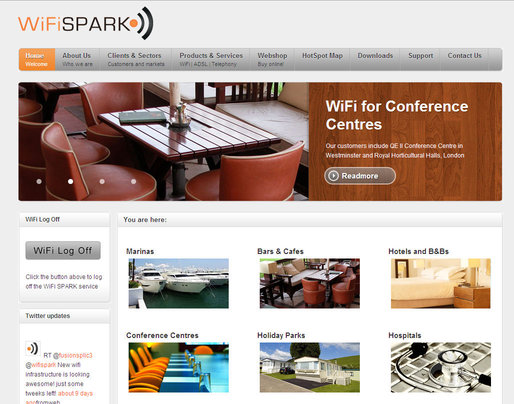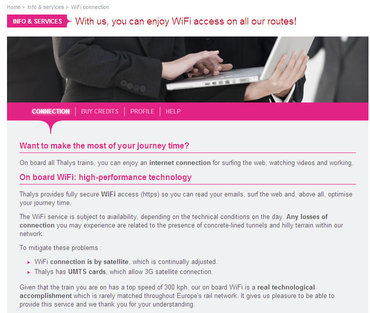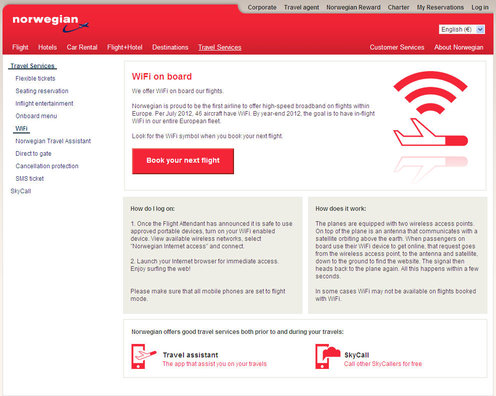Free WiFi: Better than a free lunch but is it really worth the money?
Many companies in the travel and hospitality business offer their customers free WiFi access. Some hotels advertise it prominently, trains and airlines use it to attract customers and for coffee shops it is a must-have service. Customers can’t live without it, but is it always worth it for the provider? Andrew Hennigan has been talking to users, providers and equipment suppliers to find out
“Just now I booked a hotel and they offered a complimentary breakfast,” says Petra Söderling, founder and chief executive of the Mobile Brain Bank. “I would rather have free WiFi.” It appears that Söderling is not alone. Free WiFi is fast becoming so essential that research published last year by the Accor group identified it as the third most important hotel selection criterion after location and price (First Accor European Business Traveler Research).
Söderling travels frequently and says she chooses her hotels on price. “If they don’t have free WiFi I will find a Starbucks or another place around town to connect.” If there are two hotels to choose from, with a minimal price difference, free WiFi would be the deciding factor.
Other business travellers echo her views. “In selecting hotels I will definitely take into consideration the cost of the WiFi,”says Hamish Taylor, a business strategy consultant and VP Strategic Business Development at Symrise AG. “I have no objection to a small fee, provided that it is for fast access, but if the hotel overcharges then I will eat out.”
Daniel Kowalsky, co-founder of travel website citycracks.com in Barcelona says free WiFi replaces other amenities such as an in-room TV for his generation.
Free for all
Major hotel chains are aware of this and while travellers still complain about excessive WiFi charges, the trend is clearly towards making it a standard.
“Today we have more than 2,000 hotels offering free WiFi, which represents 70% of our network,” says David Esseryk, VP Consumer Technology at the Accor Group, which owns the Sofitel, Mercure, Novotel, Ibis and other brands. ”We are the first hotel group to offer free WiFi in all our brands and on all continents,” he adds. This is hardly surprising since the company’s 2012 report revealed that this is essential for one in two business travellers.
IHG Group, owner of the Holiday Inn, InterContinental, Crowne Plaza and other brands is also headed in the same direction. “In Europe we provide free WiFi access to all guests who stay at our two newest hotel brands,” said a company spokesperson.
Significant costs
Costs for installing WiFi vary from hotel to hotel and the level of bandwidth necessary to support heavy usage in a large hotel is significant and costly. However IHG is reviewing how it moves towards offering free WiFi across all hotels. As it has such a large number of hotels, and the vast majority are owned by franchises, this isn’t something that can be done overnight.
Managed services
Equipment and services for hotels are supplied by companies like Hotel Internet Services in the USA and WIFI SPARK in the UK. WIFI SPARK" provides managed wireless solutions for many uses, including hospitality, healthcare and public services.

“Many businesses are choosing to install WiFi in hotels and restaurants and offer it as a free service,” says Oliver Malkin, WIFI SPARK’ Marketing & Communications Director. “The cost depends very much on the size of the venue and how many people are expected to use the service. Our Spark Gateway starts from £399+tax. We can also supply a fully managed network with hundreds of access points for larger venues.”
Aside from the costs, some business owners might also be concerned about technical support. WIFI SPARK addresses this by monitoring the system remotely and providing a 24/7 helpdesk to deal with end-user technical issues. This is an additional cost as there is a monthly fee for this managed service which, depending on the number of installed access points, starts at £25 a month.
Matters of loyalty
While providing the service can be inexpensive in a small hotel or coffee shop, connecting passengers on trains travelling at 300-kilometres per hour is much more complex. Even so, several companies are already doing this. In Europe Thalys provides a WiFi service on trains and the service is free for ‘comfort class’ passengers. Eurostar doesn’t offer a passenger WiFi service yet but the company has announced an agreement with Nomad Digital to add WiFi connectivity and a new infotainment system for the new e320 train sets and for existing trains when they are refurbished. According to the company this service will launch in 2013.

A good WiFi service is one of the selling points of some high-speed train services compared to airlines. “Having free reliable WiFi access changes my view as to whether I take the train or fly,” says Taylor, “and between airlines it would definitely impact my choice of carrier. I remain loyal to BA, KLM and United because they offer free WiFi in their lounges.”
While providing a WiFi service in moving trains is more complex than in buildings, delivering a service in an airplane is even more challenging because of issues of interference. Inflight WiFi is still not commonplace, but a few pioneers - United Airlines, Virgin America and Norwegian Airlines - are already providing this, usually as a paid-for service.
Norwegian Airlines, is one exception, offering a free service on nearly 50 aircraft. “Our WiFi is very popular both on shorter and longer flights,” says Norwegian’s Åsa Larsson. “On one flight we had 117 users - on a plane with 186 seats.” Unusual in Europe, Norwegian’s free WiFi service has been very effective for attracting passengers and the company won the Best Inflight Connectivity & Communications category of the 2012 Passengers Choice Awards.

No arguments over coffee
While hotel, train and airline operators can still debate the cost effectiveness of free WiFi, in a coffee shop the economic argument is overwhelming.
MyCoffeeStop, a small coffee shop just north of London, provides free WiFi for customers. “Our broadband WiFi service provided by The Phone Co-Op, costs us £39 a month, which works out to be a cost of £1.95 a day that we are open,” says co-founder Karen Mercer. “Basically we have to sell just one more coffee a day to make it worth our while.”
In any event, Mercer herself uses it and the business is a heavy user of social media so people can be encouraged to use this while in the shop.
“Another powerful advantage of WiFi is that it’s another way of making people aware we are here”, adds Mercer. The shop is tucked away at the end of a train station platform, but some customers have discovered it while looking for a WiFi network. “This makes them look around for our shop, come in and ask for the password. A Google search for ‘Coffee Shops in Enfield with WiFi’ brings up our shop in first place, too, so it attracts attention.”
Free WiFi may have become the standard in coffee shops, but in large hotels, trains and airplanes, costs remain an issue. Perhaps this translates into an advantage for smaller hotels?
Siobhan Green, CEO of Sonjara Inc, a Washington-area web solutions company, has no doubts that she would choose a hotel with free WiFi. “Hell yes,” she says. “I won’t book a hotel that charges for Internet – it annoys me that the nicer the hotel the less likely you are to get free Internet. It strikes me as gouging, especially for business travel”.
On the other hand she is quite happy to pay the upgrade fee for a better connection. “I want that choice, especially as I don’t always want or need lots of bandwidth.”

